牛津版(深圳·广州) 英语九年级上册期中专练-汉译英(含解析)
文档属性
| 名称 | 牛津版(深圳·广州) 英语九年级上册期中专练-汉译英(含解析) | 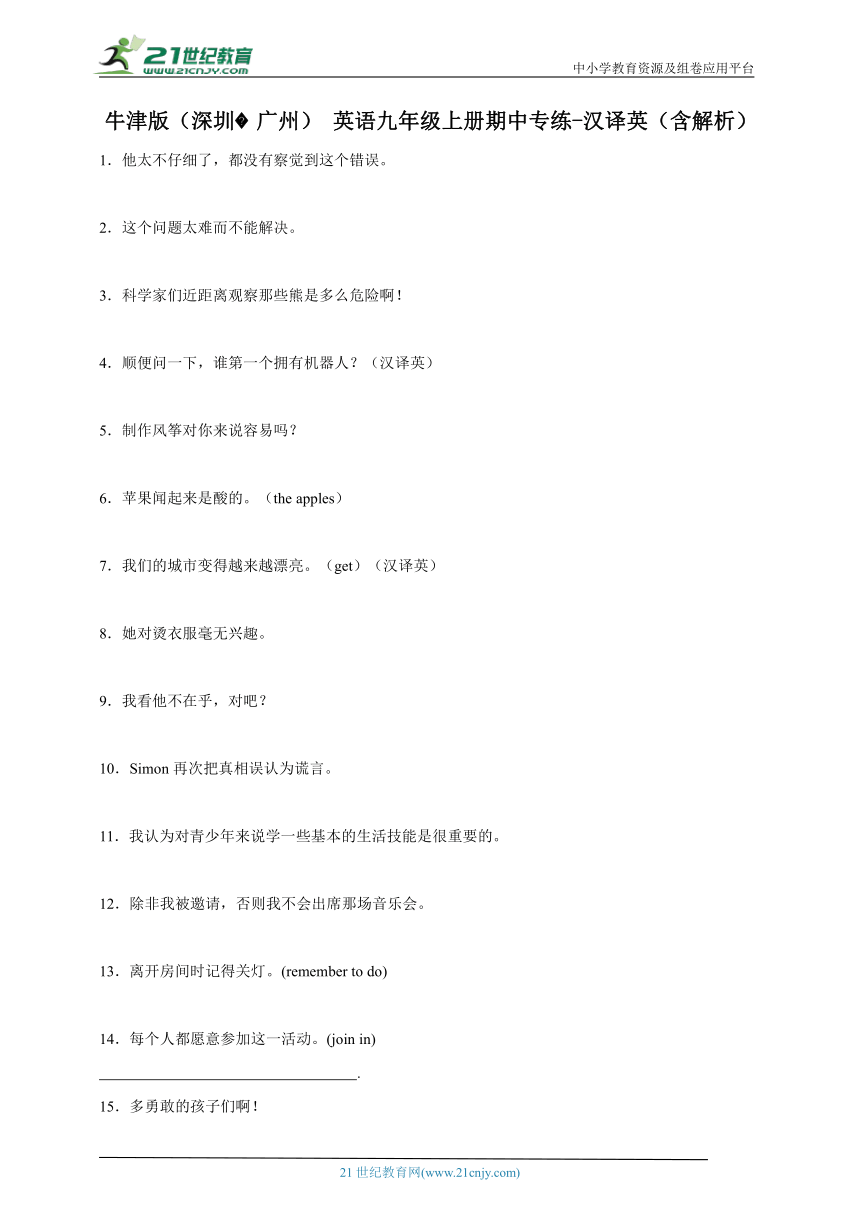 | |
| 格式 | docx | ||
| 文件大小 | 55.5KB | ||
| 资源类型 | 试卷 | ||
| 版本资源 | 牛津深圳版 | ||
| 科目 | 英语 | ||
| 更新时间 | 2023-09-25 18:51:52 | ||
图片预览

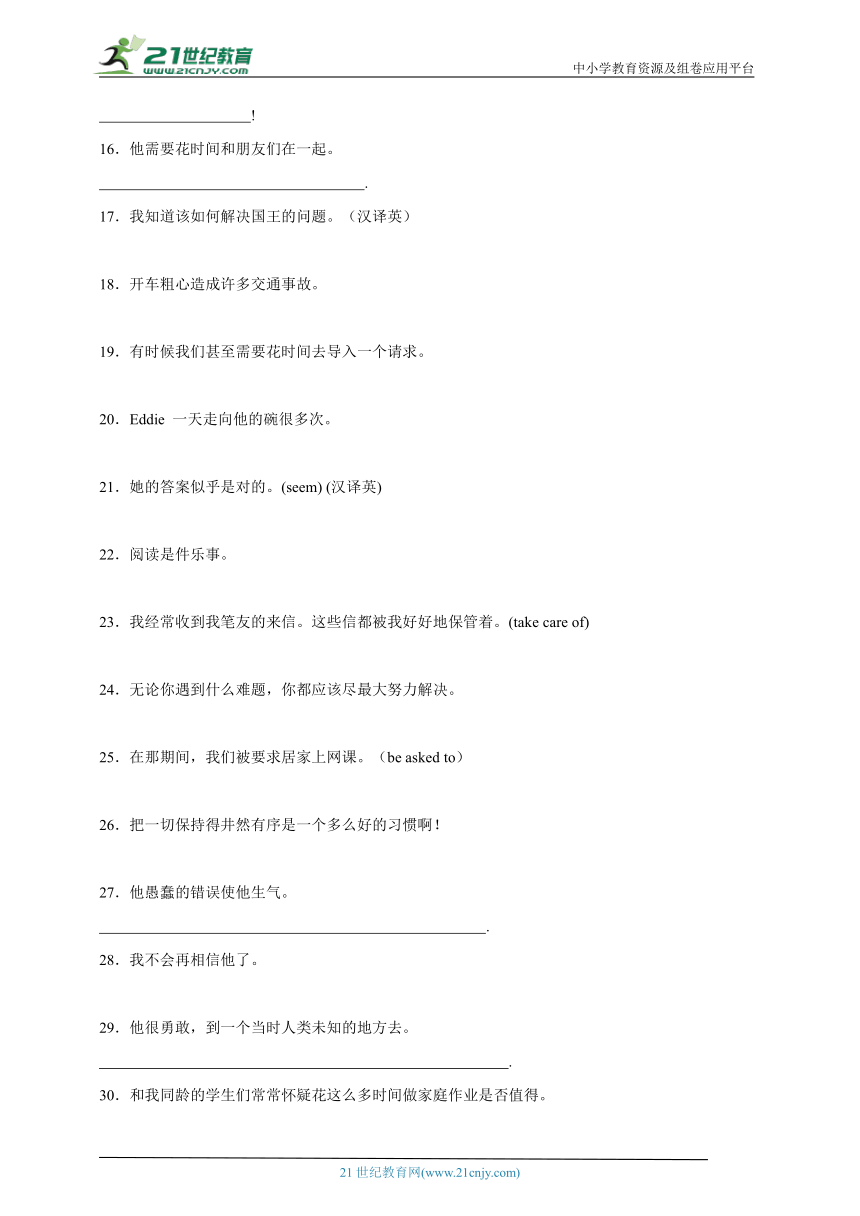
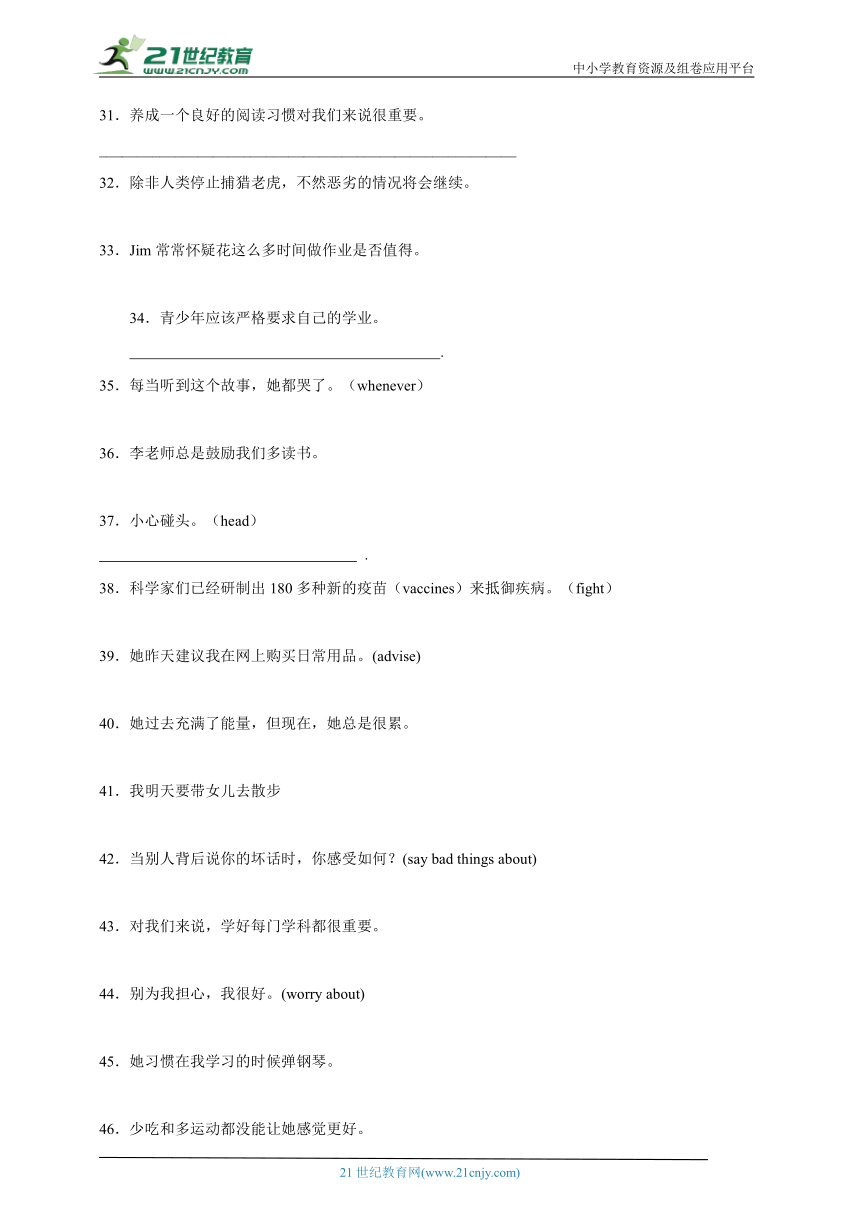
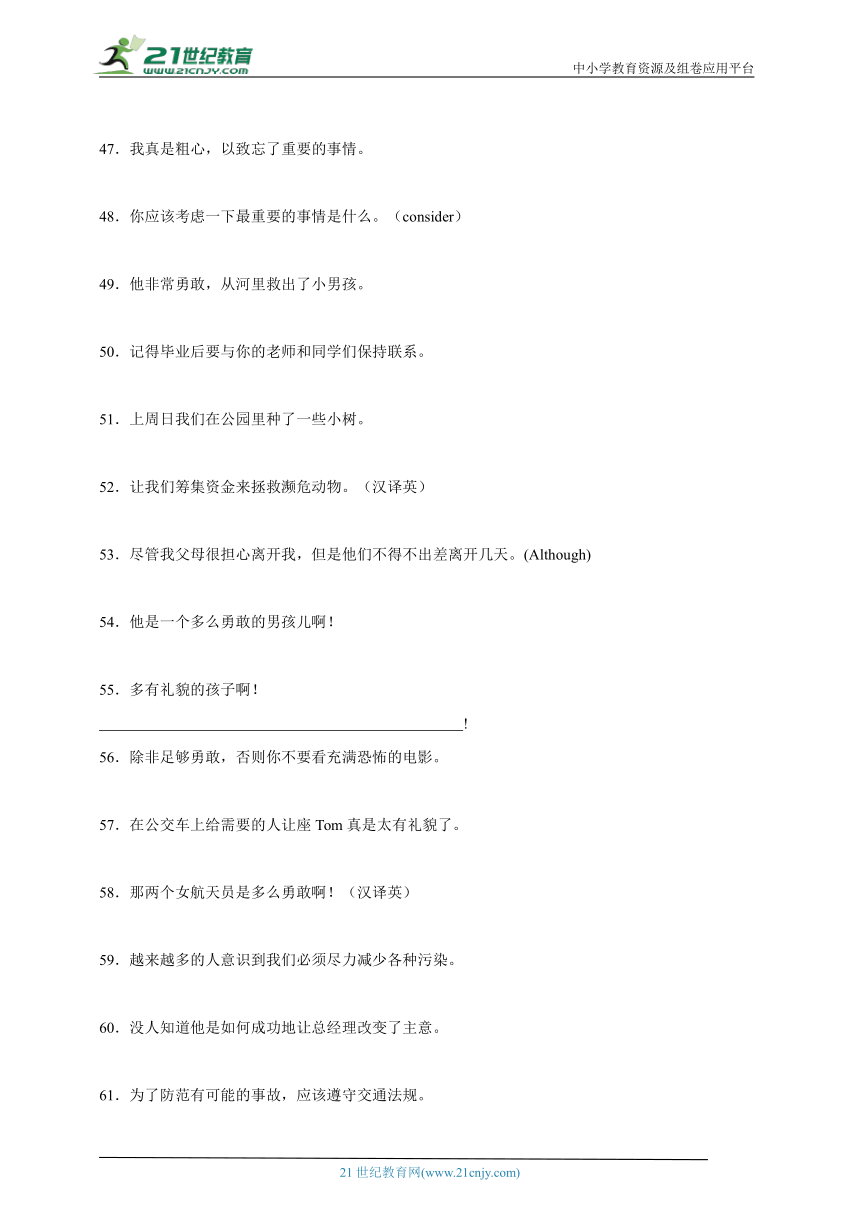
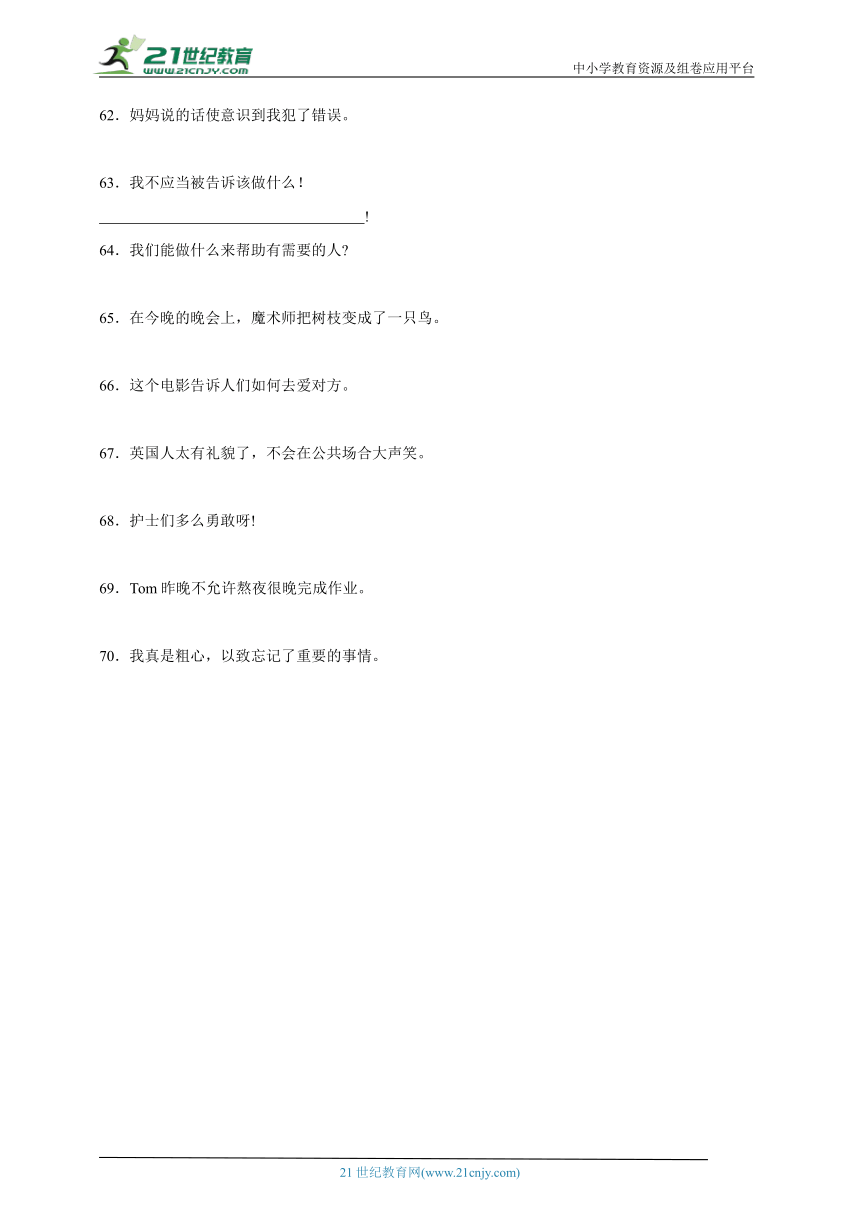
文档简介
中小学教育资源及组卷应用平台
牛津版(深圳 广州) 英语九年级上册期中专练-汉译英(含解析)
1.他太不仔细了,都没有察觉到这个错误。
2.这个问题太难而不能解决。
3.科学家们近距离观察那些熊是多么危险啊!
4.顺便问一下,谁第一个拥有机器人?(汉译英)
5.制作风筝对你来说容易吗?
6.苹果闻起来是酸的。(the apples)
7.我们的城市变得越来越漂亮。(get)(汉译英)
8.她对烫衣服毫无兴趣。
9.我看他不在乎,对吧?
10.Simon再次把真相误认为谎言。
11.我认为对青少年来说学一些基本的生活技能是很重要的。
12.除非我被邀请,否则我不会出席那场音乐会。
13.离开房间时记得关灯。(remember to do)
14.每个人都愿意参加这一活动。(join in)
.
15.多勇敢的孩子们啊!
!
16.他需要花时间和朋友们在一起。
.
17.我知道该如何解决国王的问题。(汉译英)
18.开车粗心造成许多交通事故。
19.有时候我们甚至需要花时间去导入一个请求。
20.Eddie 一天走向他的碗很多次。
21.她的答案似乎是对的。(seem) (汉译英)
22.阅读是件乐事。
23.我经常收到我笔友的来信。这些信都被我好好地保管着。(take care of)
24.无论你遇到什么难题,你都应该尽最大努力解决。
25.在那期间,我们被要求居家上网课。(be asked to)
26.把一切保持得井然有序是一个多么好的习惯啊!
27.他愚蠢的错误使他生气。
.
28.我不会再相信他了。
29.他很勇敢,到一个当时人类未知的地方去。
.
30.和我同龄的学生们常常怀疑花这么多时间做家庭作业是否值得。
31.养成一个良好的阅读习惯对我们来说很重要。
_______________________________________________________
32.除非人类停止捕猎老虎,不然恶劣的情况将会继续。
33.Jim常常怀疑花这么多时间做作业是否值得。
34.青少年应该严格要求自己的学业。
.
35.每当听到这个故事,她都哭了。(whenever)
36.李老师总是鼓励我们多读书。
37.小心碰头。(head)
.
38.科学家们已经研制出180多种新的疫苗(vaccines)来抵御疾病。(fight)
39.她昨天建议我在网上购买日常用品。(advise)
40.她过去充满了能量,但现在,她总是很累。
41.我明天要带女儿去散步
42.当别人背后说你的坏话时,你感受如何?(say bad things about)
43.对我们来说,学好每门学科都很重要。
44.别为我担心,我很好。(worry about)
45.她习惯在我学习的时候弹钢琴。
46.少吃和多运动都没能让她感觉更好。
47.我真是粗心,以致忘了重要的事情。
48.你应该考虑一下最重要的事情是什么。(consider)
49.他非常勇敢,从河里救出了小男孩。
50.记得毕业后要与你的老师和同学们保持联系。
51.上周日我们在公园里种了一些小树。
52.让我们筹集资金来拯救濒危动物。(汉译英)
53.尽管我父母很担心离开我,但是他们不得不出差离开几天。(Although)
54.他是一个多么勇敢的男孩儿啊!
55.多有礼貌的孩子啊!
!
56.除非足够勇敢,否则你不要看充满恐怖的电影。
57.在公交车上给需要的人让座Tom真是太有礼貌了。
58.那两个女航天员是多么勇敢啊!(汉译英)
59.越来越多的人意识到我们必须尽力减少各种污染。
60.没人知道他是如何成功地让总经理改变了主意。
61.为了防范有可能的事故,应该遵守交通法规。
62.妈妈说的话使意识到我犯了错误。
63.我不应当被告诉该做什么!
!
64.我们能做什么来帮助有需要的人
65.在今晚的晚会上,魔术师把树枝变成了一只鸟。
66.这个电影告诉人们如何去爱对方。
67.英国人太有礼貌了,不会在公共场合大声笑。
68.护士们多么勇敢呀!
69.Tom昨晚不允许熬夜很晚完成作业。
70.我真是粗心,以致忘记了重要的事情。
参考答案:
1.He was too careless to take notice of/notice the mistake./He was so careless that he didn’t take notice of/notice the mistake.
【详解】根据中文,可知时态为一般过去时。careless“不仔细的”;take notice of/notice“注意”;the mistake“这个错误”。一可用句型:too…to…“太……以至于不能……”;二是用句型:so+形容词+that从句“太……以至于……”,故填He was too careless to take notice of/notice the mistake./He was so careless that he didn’t take notice of/notice the mistake.
2.The problem is too difficult to solve.
【详解】problem“问题”;difficult“难的”;solve“解决”;too ... to“太……而不能”。分析句子可知,此句为一般现在时。故填The problem is too difficult to solve.
3.How dangerous it is for scientists to take a close look at the bears!
【详解】固定句式:it is+形容词+for sb to do sth“对某人来说,做某事是……的”,scientist“科学家”,dangerous是形容词,用how引导的感叹句:how+形容词+主谓;take a close look at the bears“近距离观察那些熊”,故填How dangerous it is for scientists to take a close look at the bears!
4.By the way, who is the first person to own the robot
【详解】by the way“顺便一问”;who“谁”;the first person to do sth“第一个做某事的人”;own the robot“拥有机器人”。故填By the way, who is the first person to own the robot
5.Is it easy for you to make a kite?
【详解】做……对……来说容易:it is easy for sb. to do sth.;制作风筝:make a kite。结合语境可知,此题用一般现在时的一般疑问句,it为形式主语,真正的主语是不定式to make a kite。故填Is it easy for you to make a kite。
6.The apples smell sour.
【详解】the apples作主语;smell“闻起来”,为系动词,作谓语;sour“酸的”,为形容词,作表语;句子为一般现在时;句首字母大写。故填The apples smell sour.
7.Our city is getting more and more beautiful.
【详解】我们的:our;城市:city;变得:get;越来越漂亮:more and more beautiful。结合句意可知应用现在进行时,其结构为“be doing”。主语city是单数,be动词用is,因此是is getting。首字母大写。故填Our city is getting more and more beautiful.
8.She has no interest in ironing clothes.
【详解】她:she,句子主语;对……毫无兴趣:have no interest in doing sth,固定短语,陈述事实应用一般现在时,主语是第三人称单数,动词用三单形式has;烫衣服:iron clothes,此处动词应用动名词形式,故填She has no interest in ironing clothes.
9.I don’t suppose he cares, does he
【详解】我看他不在乎,对吧?根据猜想---不怎么样时,要否定转移,否定suppose,这是反义疑问句,前面肯定,后面否定,故答案是:I don’t suppose he cares, does he
10.Simon mistook the truth for a lie again /Simon mistook the truth for a lie once again.
【详解】这是陈述句。句子的主语是“Simon”,表达“把……误认为是……”用动词短语“mistake…for…”。句子是一般过去时,谓语动词用过去式“mistook”。表达“真相”用名词“truth”,是确指,用定冠词“the”放在名词前。表达“谎言”用名词“lie”,是泛指“一个”,用不定冠词“a”放在名词前。表达“再次”用副词“again”或短语“once again”放在句末。故填Simon mistook the truth for a lie again / Simon mistook the truth for a lie once again.
11.I think it’s important for teenagers to learn some basic life skills.
【详解】“我”为I;“认为”为think;“重要的”为important;“青少年”为teenagers;“学一些基本的生活技能”为learn some basic life skills。结合语境可知,本句是含有宾语从句的复合句,主句是一般现在时,即I think。从句使用固定句型:it’s+形容词+for sb. to do sth.“对某人来说干某事怎么样”。故填I think it’s important for teenagers to learn some basic life skills.
12.Unless/Only if being invited/I am invited, I won’t attend/take part in/join in the/that concert.
I won’t attend/take part in/join in the/that concert, unless/only if being invited/I am invited.
【详解】“除非”unless/only if,引导条件状语从句;being invited“被邀请”/I am invited“我被邀请”,条件状语从句用一般现在时;won’t attend/take part in/join in the/that concert“不会出席那场音乐会”。故填Unless/Only if being invited/I am invited, I won’t attend/take part in/join in the/that concert.或I won’t attend/take part in/join in the/that concert, unless/only if being invited/I am invited.
13.Remember to turn off the lights when you leave the room.
【详解】根据中文句意可知,本句为复合句,由when引导的时间状语从句,使用一般现在时,主句为祈使句。remember to do sth“记得做某事”;turn off the lights“关灯”;when“当……时”;you“你”;leave the room“离开房间”。故填Remember to turn off the lights when you leave the room.
14.Everyone is willing to join in the activity
【详解】每个人:everyone,作主语首字母大写;愿意做某事:be willing to do;参加这一活动:join in the activity。根据中文提示,此句时态宜用一般现在时,主语“Everyone”是第三人称单数,因此“is willing”符合句意。故填Everyone is willing to join in the activity。
15.What brave children (they are)/How brave the children are
【详解】brave“勇敢的”,children“孩子们”,本句可用“What+adj+可数名词复数+主谓”或“How+adj+主谓”句型表示,故填What brave children (they are)/How brave the children are。
16.He needs to spend time with friends
【详解】he他,need to do sth需要做某事,spend time with friends花时间和朋友们在一起,本句时态是一般现在时,主语是he,动词用三单。故填He needs to spend time with friends。
17.I know how to solve the king’s problem.
【详解】I“我”,作主语;know“知道”,作谓语;how to solve“如何解决”,“疑问词+不定式”作宾语;the king’s problem“国王的问题”。故填I know how to solve the king’s problem.
18.Careless driving causes many traffic accidents.
【详解】开车粗心:careless driving,作主语;造成:cause,作谓语;许多:many;交通事故:traffic accidents,作宾语。根据句意可知,此句时态用一般现在时,主语是第三人称单数,谓语动词用三单形式。故填Careless driving causes many traffic accidents.
19.Sometimes we even need to spend time leading into a request.
【详解】有时候:sometimes;甚至:even;需要做某事:need to do sth.;花费时间做某事:spend time doing sth.;导入一个请求:lead into a request。由语境可知,时态用一般现在时,主语“we我们”为第一人称,谓语动词need用原形。故填Sometimes we even need to spend time leading into a request.
20.Eddie walks to his bowl many times a day.
【详解】Eddie是人名,作主语;walk to“走向”,作谓语;his bowl“他的碗”,作宾语;many times“很多次”;a day“一天”,作时间状语。根据汉语提示,时态为一般现在时,故填Eddie walks to his bowl many times a day.
21.Her answer seems to be correct.
【详解】her answer“她的答案”,作主语,放于句首,首字母大写,主语是单数,谓语用第三人称单数;seem to do sth.“似乎做某事”,动词短语;correct“正确的”,形容词,此处需借助be动词构成系表结构。故填Her answer seems to be correct.
22.Reading is a pleasure.
【详解】结合语境可知,时态是一般现在时;阅读:reading,作主语,故系动词应用is;一件乐事:a pleasure。故填Reading is a pleasure.
23.I often hear from my pen friends. The letters are taken good care of by me.
【详解】我:I;经常:often;收到……的来信:hear from;我笔友:my pen friends;有标志词often,此句为一般现在时。这些信:these letters;保管:take care of;都被我好好地保管着,应该是被动语态,these letters做主语,谓语动词选择are,take过去分词,taken;被我:by me。故填I often hear from my pen friends. The letters are taken good care of by me.
24.No matter what problems you meet, you should try your best to solve them.
【详解】无论什么:no matter what,引导让步状语从句;难题:problem;你遇到:you meet;你应该:you should;尽最大努力做某事:try one’s best to do sth.;解决:solve。problem是可数名词,根据语境可知,此处用应复数形式,solve是及物动词,需接宾语,用them,指代前文提到的“问题”。故填No matter what problems you meet, you should try your best to solve them.
25.During that period, we were asked to have classes online at home.
【详解】根据中文句意可知,During that period“在那期间”;be asked to do“被要求做”;have classes online“上网课”;at home“在家”。本句为陈述句,陈述一个过去的事情,使用一般过去时。主语为we,使用be动词were。故填During that period, we were asked to have classes online at home.
26.What a good habit (it is) to keep everything in good order!
【详解】由句意知此句为感叹句,且句中“一个多么好的习惯”构成名词短语,用what引导感叹句,其构成为“What(+a/an)+形容词+名词(+主语+谓语)!”;一个好习惯a good habit;一切everything;把……保持得井然有序keep...in good order,在句中作主语,因为主语太长,可用it作形式主语,此句为一般现在时,故谓语动词be用第三人称单数is,用动词不定式to keep everything in good order作真正的主语,it is可省略。故填What a good habit (it is) to keep everything in good order!
27.His stupid mistake made him angry
【详解】他(的):his;愚蠢的错误:stupid mistake;使他生气:make him angry。结合语境可知,该句在描述发生过的事情,应使用一般过去时。谓语动词make应改为made。故填His stupid mistake made him angry。
28.I will never trust him again.
【详解】我:I;不会:never;再:again;相信:trust。分析语境可知,此句用will表示愿意,后跟动词原形,never在句子中的位置是助动词、情态动词之后,trust sb表示“相信某人”,sb用宾格him。故填I will never trust him again.
29.It was brave of him to go to a place that was unknown to humans
【详解】根据题干,可用句型it is+adj+for/of sb to do sth表示“某人做某事如何”;句子时态是一般过去时,应用was;形容词brave是形容人的品格,介词用of;到一个地方去:go to a place;可用定语从句表示“人类未知的”来修饰先行词place,即that was unknown to humans。故填It was brave of him to go to a place that was unknown to humans。
30.Students of my age often doubt if/whether it is worth spending so much time doing homework.
【详解】students of my age表示和我同龄的学生们;doubt的意思是怀疑;这里是if/whether引导的宾语从句;be worth doing sth.表示值得去做某事;spend+时间+doing sth.表示花费时间做某事;根据汉语提示,故填Students of my age often doubt if/whether it is worth spending so much time doing homework.
31.It’s very important for us to develop a good reading habit.
【详解】这句话应使用句型“It is +形容词+for sb. to do sth.”,表示“对于某人来说做某事是……的”,句型中It是形式主语,真正的主语是动词不定式;very important“非常重要的”;for us“对于我们”;develop“发展,培养”;a good reading habit“一个好的阅读习惯”。我们根据这个句型,将单词和短语一一代入即可,故填It is very important for us to develop a good reading habit.
32.The bad situation will continue unless people stop hunting tigers.
【详解】根据汉语意思可知,该句为unless引导的条件状语从句,遵循“主将从现”;the bad situation“恶劣的情况”,作主句主语;will continue“将会继续”,作主句谓语;unless“除非”,引导从句;people“人类”,从句主语;stop“停止”,从句谓语;hunting tigers“捕猎老虎”,从句宾语。故填The bad situation will continue unless people stop hunting tigers.
33.Jim often doubts whether it is worth spending so much time on homework.
【详解】这里是whether 引导的宾语从句;Jim第三人称单数;doubt变第三人称单数;短语be worth doing sth.表示值得做某事;spend+时间+doing sth.表示花费时间做某事;so much time表示如此多的时间;根据汉语提示, 故填Jim often doubts whether it is worth spending so much time on homework.
34.Teenagers should be strict in their schoolwork
【详解】“青少年”译为“teenager”,是可数名词,此处应用复数形式表示一类人teenagers,作主语;“应该”译为“should”,是情态动词,后面用动词原形;“对某事严格要求”译为“be strict in”,作谓语;“自己的学业”译为“their schoolwork”。故填Teenagers should be strict in their schoolwork。
35.She cries whenever/no matter when she hears the story.
【详解】每当:whenever/no matter when;听到:hear;哭:cry。结合语境可知,句子应用whenever引导让步状语从句,且时态应用一般现在时,主语she是第三人称单数,谓语动词也应用三单形式。故填She cries whenever/no matter when she hears the story.
36.Miss Li always encourages us to read more books.
【详解】Miss Li李老师,always总是,encourage sb to do sth鼓励某人做某事,us我们,read more books多读书。时态是一般现在时,主语是第三人称单数,动词用三单,故填Miss Li always encourages us to read more books.
37.Mind your head
【详解】mind注意,在意;your head你的头;句子为祈使句,应用动词原形开头,句首字母大写。故填Mind your head。
38.Scientists have (already) developed more than 180 new vaccines to fight against diseases.
【详解】根据中文句意可知,Scientists“科学家们”;already“已经”;develop“研制”;more than“超过”;new vaccines“新的疫苗”;fight against“抵御”;diseases“疾病”。本句为现在完成时,主语为名词复数,使用助动词have。同时使用动词不定式作目的状语。故填Scientists have (already) developed more than 180 new vaccines to fight against diseases.
39.She advised me to buy daily necessities online yesterday.
【详解】advise sb to do sth“建议某人去做某事”;buy daily necessities online“在网上购买日常用品”;yesterday“昨天”,句子是一般过去时,故填She advised me to buy daily necessities online yesterday.
40.She used to be full of energy, but now she’s always tired.
【详解】used to do sth“过去常常做某事”;be full of“充满”;energy“能量”;but now“但是现在”;be tired“疲惫的”,always“总是”,后半句用一般现在时,主语she是第三人称,be动词用is,故填She used to be full of energy, but now she’s always tired.
41.Tomorrow I will take my daughter for a walk.
【详解】我:I,作主语;明天:tomorrow,作时间状语,放在句首;带某人去散步:take sb. for a walk;我女儿:my daughter。根据语境,可知用一般将来时,结构为will do。故填Tomorrow I will take my daughter for a walk.
42.How do you feel when others say bad things about you behind your back
【详解】“如何”how;“你”you;“感觉”feel;“当……时候”when,引导时间状语从句;“别人”others;“说你的坏话”say bad things about you;“在你的背后”behind your back。结合语境可知,此句应用一般现在时,主句主语“you”是第二人称,故助动词应用do;从句主语“others”是复数形式,故动词应用原形。故填How do you feel when others say bad things about you behind your back
43.It’s important for us to learn/study every/each subject/all subjects well.
【详解】It’s important for sb to do sth“对某人来说做某事是很重要的”;us“我们”;learn/study every/each subject/all subjects well“学好每门学科”。本句时态是一般现在时,故填It’s important for us to learn/study every/each subject/all subjects well.
44.Don’t worry about me. I’m very well.
【详解】worry about sb“担心某人”,结合中文提示可知,句子是否定的祈使句,应以don’t开头,me“我”,I’m very well“我很好”,此处的well是形容词,表示身体健康的,故填Don’t worry about me. I’m very well.
45.She has a habit of playing the piano when I’m studying.
【详解】“她”为she,主格代词;“有”为have;“一个弹钢琴的习惯”为a habit of playing the piano;“当……时候”为when,引导时间状语从句;“我”为I,主格代词;“学习”为study。结合语境可知,主句应用一般现在时,主语“she”为第三人称单数形式,动词应用单三式has;从句应用现在进行时(be doing),主语“I”是第一人称,be动词用am,study的现在分词是studying。故填She has a habit of playing the piano when I’m studying.
46.Eating less and exercising more didn’t make her feel better.
【详解】结合语境可知本句用一般过去时。“少吃”eat less;“多运动”exercise more;“和”and。此处“少吃和多运动”是句子主语,所以动词要用动名词;“让某人做某事”make sb.do sth.,“感觉更好”feel better。故填Eating less and exercising more didn’t make her feel better.
47.I was so careless that I forgot important things.
【详解】我I,粗心be careless,如此……以致……so...that...,忘了forget,重要的事情important things,时态是一般过去时,动词用过去式。故填I was so careless that I forgot important things.
48.You should consider what the most important thing is.
【详解】应该:should;最重要的事情:the most important thing。consider后接宾语从句,根据句意,此处宾语从句的引导词为what,一定要注意陈述句语序,应为the most important thing is。故填You should consider what the most important thing is.
【点睛】宾语从句的语序是陈述句语序即:连接代词/副词+主语+谓语+其他成分。本题中“最重要的事情是什么”在宾语从句中的语序为what the most important thing is。
49.
He was so brave that he saved the little boy from the river.
【详解】他:he;勇敢:brave;从河里:from the river;救出了小男孩:save the little boy。这里是由so…that…引导的句子,时态为一般过去时。故填He was so brave that he saved the little boy from the river.
50.Remember to keep in touch with your teachers and classmates after graduation.
【详解】remember to do sth记得去做某事,after graduation毕业后,keep in touch with your teachers and classmates与你的老师和同学们保持联系。故填Remember to keep in touch with your teachers and classmates after graduation.
51.We planted some young trees in the park last week.
【详解】上周“last week”,在句子作时间状语;我们“we”,在句中作主语;种“plant”,时态为一般过去时,此处要用过去式planted;一些小树“some young trees”,作宾语;在公园里“in the park”,作地点状语。故填We planted some young trees in the park last week.
52.Let’s raise (some) money to save animals in danger.
【详解】let’s do sth“让我们做某事”;raise (some) money“筹集资金”;save animals in danger“拯救濒危动物”,动词不定式作目的状语,故填Let’s raise (some) money to save animals in danger.
53.Although my parents were very worried about leaving me they had to go away on business for a few days.
【详解】根据提示词“Although”可知,本句是although引导的让步状语从句,此处时态为一般过去时。although尽管;my parents我父母;be worried about担心……,主语my parents为复数,be动词为were;leave离开;have to不得不,过去式为had to;go away离开;on business出差;for a few days几天。故填Although my parents were very worried about leaving me, they had to go away on business for a few days.
54.What a brave boy he is!
【详解】真是一个感叹句,brave“勇敢的”,形容词;boy“男孩”;he is“他是”,中心词boy是可数名词单数形式,用what引导的感叹句结构:what+a/an+形容词+名词单数形式+主谓,brave是以辅音音素开开头的,故填What a brave boy he is!
55.What a polite child
【详解】polite礼貌的,child孩子,本句强调的中心词是可数名词单数child,所以用“What+a/an+adj+可数名词单数!”句型,polite首字母发辅音音素,What a polite child。
56.You won’t see films full of horror unless you’re brave enough.
【详解】根据汉语提示,本句是unless引导的条件状语从句,遵循主句用一般将来时,从句用一般现在时态,除非:unless;你:you,作主句主语;看:see;充满恐怖的电影:films full of horror;你:you,作从句主语;足够勇敢:brave enough;主句是一般将来时的否定形式,用won’t+动词原形;从句中brave是形容词,主语是you,be动词用are,故填You won’t see films full of horror unless you’re brave enough.
57.It’s really polite of Tom to offer/give his seat to the people in need on the bus.
【详解】在公交车上:on the bus;给某人提供某物:offer/give sth. to sb.;需要的人:the people in need,in need作后置定语;给需要的人让座:offer/give his seat to the people in need;Tom真是太有礼貌了:It’s really polite of Tom。本句适用“It’s +形容词+ of/for sb. +不定式短语+其他”固定结构,it作形式主语,不定式是真正主语;of 用于指某人的性格、属性、特征等,介词for表示对象,意为“对……来说”;结合语境,句子描述Tom的性格特点,介词用of,故填It’s really polite of Tom to offer/give his seat to the people in need on the bus.
58.How brave the two women astronauts are!
【详解】“那两个女宇航员”the two women astronauts;“是”are;“勇敢的”brave;此句为感叹句,感叹句结构为“How+adj.+主+谓”,故填How brave the two women astronauts are!
59.More and more people have realized/realize that we must try to reduce all kinds of pollution.
【详解】“比较级+and+比较级”表示“越来越……”;try to do sth.尽力做某事; all kinds of各种各样的;根据中文句意可知用现在完成时态或一般现在时。故填More and more people have realized/realize that we must try to reduce all kinds of pollution.
60.No one knows how he succeeded in getting the general manager to change his mind.
【详解】no one表示“没有人”,作主语,谓语动词用第三人称单数,know表示“知道”,后接how引导的宾语从句,主句时态是一般现在时,从句描绘发生过的事,用一般过去时。succeed in doing sth表示“成功做某事”;get sb to do sth表示“让某人做某事”;the general manager表示“总经理”;change his mind表示“改变主意”。故填No one knows how he succeeded in getting the general manager to change his mind.
61.Traffic rules should be obeyed/followed in order to guard against any possible accidents.
【详解】in order to do“为了做……”;guard against“防范”;any possible accidents“任何可能的事故”;traffic rules“交通法规”;should“应该”,是情态动词;obey/follow“遵守”。分析句意可知这是一个含情态动词的被动语态结构:情态动词+be done。故填Traffic rules should be obeyed/followed in order to guard against any possible accidents.
62.What my mother said made me realize that I had made a mistake./What my mother said made me realize my mistake.
【详解】妈妈说的话:what my mother said;使:make;我:me,动词后人称代词用宾格;意识到:realize;我犯了错误:I made a mistake/my mistake。根据汉语可知,时态为一般过去时,故动词要用过去式。故填What my mother said made me realize that I had made a mistake./What my mother said made me realize my mistake.
63.I should not be told what to do
【详解】I我,should not be told不应当被告诉,what to do该做什么。故填I should not be told what to do。
64.What can we do to help those in need
【详解】句子是特殊疑问句,我们能做什么:what can we do;帮助:help;有需要的人:those in need;由语境可知,“帮助有需要的人”是目的,作目的状语用动词不定式。故填What can we do to help those in need
65.The magician changed the stick into a bird in the party tonight.
【详解】根据中文句意可知,magician“魔术师”;change…into“把……变成”;stick“树枝”;a bird“一只鸟”;in the party tonight“在今晚的晚会上”。本句描述过去发生动作,使用一般过去时。故填The magician changed the stick into a bird in the party tonight.
66.The movie tells people how to love each other.
【详解】the movie“这部电影”,作主语;tell sb sth“告诉某人某事”,作谓语,时态是一般现在时,主语是单数,tell用单数形式tells;people“人们”;how to love each other“如何去爱对方”,“how+不定式”作宾语。故填The movie tells people how to love each other.
67.British people are too polite to laugh loudly in public.
【详解】too…to…“太……而不能……”;polite“有礼貌的”;laugh loudly“大声笑”;in public“在公共场合”。故答案为British people are too polite to laugh loudly in public.
68.What brave nurses (they are)!/How brave the nurses are!
【详解】根据汉语意思以及标点符号可知,本题是感叹句;brave“勇敢的”;nurse“护士”,复数是“nurses”,因此本题可以用How引导的感叹句,结构是:How +形容词或者副词+主语+谓语!或者What引导的感叹句,结构是:What+形容词+可数名词复数(主谓)!本题描述事实,因此用一般现在时,主语是第三人称复数,系动词用are。故答案为What brave nurses (they are)!/How brave the nurses are!
69.Tom wasn’t allowed to stay up late to finish homework last night.
【详解】根据“昨晚”可知,本题时态为一般过去时。 不被允许做某事wasn’t allowed to do sth.;熬夜很晚stay up late;完成作业finish homework,此处应用动词不定式表目的;昨晚last night。故填Tom wasn’t allowed to stay up late to finish homework last night.
70.I was so careless that I forgot the important things.
【详解】表示“如此……以至于……”应用so...that...,that引导结果状语从句;粗心:careless;忘记:forget;重要的事情:the important things。主句和从句都用一般过去时。故填I was so careless that I forgot the important things.
21世纪教育网 www.21cnjy.com 精品试卷·第 2 页 (共 2 页)
21世纪教育网(www.21cnjy.com)
牛津版(深圳 广州) 英语九年级上册期中专练-汉译英(含解析)
1.他太不仔细了,都没有察觉到这个错误。
2.这个问题太难而不能解决。
3.科学家们近距离观察那些熊是多么危险啊!
4.顺便问一下,谁第一个拥有机器人?(汉译英)
5.制作风筝对你来说容易吗?
6.苹果闻起来是酸的。(the apples)
7.我们的城市变得越来越漂亮。(get)(汉译英)
8.她对烫衣服毫无兴趣。
9.我看他不在乎,对吧?
10.Simon再次把真相误认为谎言。
11.我认为对青少年来说学一些基本的生活技能是很重要的。
12.除非我被邀请,否则我不会出席那场音乐会。
13.离开房间时记得关灯。(remember to do)
14.每个人都愿意参加这一活动。(join in)
.
15.多勇敢的孩子们啊!
!
16.他需要花时间和朋友们在一起。
.
17.我知道该如何解决国王的问题。(汉译英)
18.开车粗心造成许多交通事故。
19.有时候我们甚至需要花时间去导入一个请求。
20.Eddie 一天走向他的碗很多次。
21.她的答案似乎是对的。(seem) (汉译英)
22.阅读是件乐事。
23.我经常收到我笔友的来信。这些信都被我好好地保管着。(take care of)
24.无论你遇到什么难题,你都应该尽最大努力解决。
25.在那期间,我们被要求居家上网课。(be asked to)
26.把一切保持得井然有序是一个多么好的习惯啊!
27.他愚蠢的错误使他生气。
.
28.我不会再相信他了。
29.他很勇敢,到一个当时人类未知的地方去。
.
30.和我同龄的学生们常常怀疑花这么多时间做家庭作业是否值得。
31.养成一个良好的阅读习惯对我们来说很重要。
_______________________________________________________
32.除非人类停止捕猎老虎,不然恶劣的情况将会继续。
33.Jim常常怀疑花这么多时间做作业是否值得。
34.青少年应该严格要求自己的学业。
.
35.每当听到这个故事,她都哭了。(whenever)
36.李老师总是鼓励我们多读书。
37.小心碰头。(head)
.
38.科学家们已经研制出180多种新的疫苗(vaccines)来抵御疾病。(fight)
39.她昨天建议我在网上购买日常用品。(advise)
40.她过去充满了能量,但现在,她总是很累。
41.我明天要带女儿去散步
42.当别人背后说你的坏话时,你感受如何?(say bad things about)
43.对我们来说,学好每门学科都很重要。
44.别为我担心,我很好。(worry about)
45.她习惯在我学习的时候弹钢琴。
46.少吃和多运动都没能让她感觉更好。
47.我真是粗心,以致忘了重要的事情。
48.你应该考虑一下最重要的事情是什么。(consider)
49.他非常勇敢,从河里救出了小男孩。
50.记得毕业后要与你的老师和同学们保持联系。
51.上周日我们在公园里种了一些小树。
52.让我们筹集资金来拯救濒危动物。(汉译英)
53.尽管我父母很担心离开我,但是他们不得不出差离开几天。(Although)
54.他是一个多么勇敢的男孩儿啊!
55.多有礼貌的孩子啊!
!
56.除非足够勇敢,否则你不要看充满恐怖的电影。
57.在公交车上给需要的人让座Tom真是太有礼貌了。
58.那两个女航天员是多么勇敢啊!(汉译英)
59.越来越多的人意识到我们必须尽力减少各种污染。
60.没人知道他是如何成功地让总经理改变了主意。
61.为了防范有可能的事故,应该遵守交通法规。
62.妈妈说的话使意识到我犯了错误。
63.我不应当被告诉该做什么!
!
64.我们能做什么来帮助有需要的人
65.在今晚的晚会上,魔术师把树枝变成了一只鸟。
66.这个电影告诉人们如何去爱对方。
67.英国人太有礼貌了,不会在公共场合大声笑。
68.护士们多么勇敢呀!
69.Tom昨晚不允许熬夜很晚完成作业。
70.我真是粗心,以致忘记了重要的事情。
参考答案:
1.He was too careless to take notice of/notice the mistake./He was so careless that he didn’t take notice of/notice the mistake.
【详解】根据中文,可知时态为一般过去时。careless“不仔细的”;take notice of/notice“注意”;the mistake“这个错误”。一可用句型:too…to…“太……以至于不能……”;二是用句型:so+形容词+that从句“太……以至于……”,故填He was too careless to take notice of/notice the mistake./He was so careless that he didn’t take notice of/notice the mistake.
2.The problem is too difficult to solve.
【详解】problem“问题”;difficult“难的”;solve“解决”;too ... to“太……而不能”。分析句子可知,此句为一般现在时。故填The problem is too difficult to solve.
3.How dangerous it is for scientists to take a close look at the bears!
【详解】固定句式:it is+形容词+for sb to do sth“对某人来说,做某事是……的”,scientist“科学家”,dangerous是形容词,用how引导的感叹句:how+形容词+主谓;take a close look at the bears“近距离观察那些熊”,故填How dangerous it is for scientists to take a close look at the bears!
4.By the way, who is the first person to own the robot
【详解】by the way“顺便一问”;who“谁”;the first person to do sth“第一个做某事的人”;own the robot“拥有机器人”。故填By the way, who is the first person to own the robot
5.Is it easy for you to make a kite?
【详解】做……对……来说容易:it is easy for sb. to do sth.;制作风筝:make a kite。结合语境可知,此题用一般现在时的一般疑问句,it为形式主语,真正的主语是不定式to make a kite。故填Is it easy for you to make a kite。
6.The apples smell sour.
【详解】the apples作主语;smell“闻起来”,为系动词,作谓语;sour“酸的”,为形容词,作表语;句子为一般现在时;句首字母大写。故填The apples smell sour.
7.Our city is getting more and more beautiful.
【详解】我们的:our;城市:city;变得:get;越来越漂亮:more and more beautiful。结合句意可知应用现在进行时,其结构为“be doing”。主语city是单数,be动词用is,因此是is getting。首字母大写。故填Our city is getting more and more beautiful.
8.She has no interest in ironing clothes.
【详解】她:she,句子主语;对……毫无兴趣:have no interest in doing sth,固定短语,陈述事实应用一般现在时,主语是第三人称单数,动词用三单形式has;烫衣服:iron clothes,此处动词应用动名词形式,故填She has no interest in ironing clothes.
9.I don’t suppose he cares, does he
【详解】我看他不在乎,对吧?根据猜想---不怎么样时,要否定转移,否定suppose,这是反义疑问句,前面肯定,后面否定,故答案是:I don’t suppose he cares, does he
10.Simon mistook the truth for a lie again /Simon mistook the truth for a lie once again.
【详解】这是陈述句。句子的主语是“Simon”,表达“把……误认为是……”用动词短语“mistake…for…”。句子是一般过去时,谓语动词用过去式“mistook”。表达“真相”用名词“truth”,是确指,用定冠词“the”放在名词前。表达“谎言”用名词“lie”,是泛指“一个”,用不定冠词“a”放在名词前。表达“再次”用副词“again”或短语“once again”放在句末。故填Simon mistook the truth for a lie again / Simon mistook the truth for a lie once again.
11.I think it’s important for teenagers to learn some basic life skills.
【详解】“我”为I;“认为”为think;“重要的”为important;“青少年”为teenagers;“学一些基本的生活技能”为learn some basic life skills。结合语境可知,本句是含有宾语从句的复合句,主句是一般现在时,即I think。从句使用固定句型:it’s+形容词+for sb. to do sth.“对某人来说干某事怎么样”。故填I think it’s important for teenagers to learn some basic life skills.
12.Unless/Only if being invited/I am invited, I won’t attend/take part in/join in the/that concert.
I won’t attend/take part in/join in the/that concert, unless/only if being invited/I am invited.
【详解】“除非”unless/only if,引导条件状语从句;being invited“被邀请”/I am invited“我被邀请”,条件状语从句用一般现在时;won’t attend/take part in/join in the/that concert“不会出席那场音乐会”。故填Unless/Only if being invited/I am invited, I won’t attend/take part in/join in the/that concert.或I won’t attend/take part in/join in the/that concert, unless/only if being invited/I am invited.
13.Remember to turn off the lights when you leave the room.
【详解】根据中文句意可知,本句为复合句,由when引导的时间状语从句,使用一般现在时,主句为祈使句。remember to do sth“记得做某事”;turn off the lights“关灯”;when“当……时”;you“你”;leave the room“离开房间”。故填Remember to turn off the lights when you leave the room.
14.Everyone is willing to join in the activity
【详解】每个人:everyone,作主语首字母大写;愿意做某事:be willing to do;参加这一活动:join in the activity。根据中文提示,此句时态宜用一般现在时,主语“Everyone”是第三人称单数,因此“is willing”符合句意。故填Everyone is willing to join in the activity。
15.What brave children (they are)/How brave the children are
【详解】brave“勇敢的”,children“孩子们”,本句可用“What+adj+可数名词复数+主谓”或“How+adj+主谓”句型表示,故填What brave children (they are)/How brave the children are。
16.He needs to spend time with friends
【详解】he他,need to do sth需要做某事,spend time with friends花时间和朋友们在一起,本句时态是一般现在时,主语是he,动词用三单。故填He needs to spend time with friends。
17.I know how to solve the king’s problem.
【详解】I“我”,作主语;know“知道”,作谓语;how to solve“如何解决”,“疑问词+不定式”作宾语;the king’s problem“国王的问题”。故填I know how to solve the king’s problem.
18.Careless driving causes many traffic accidents.
【详解】开车粗心:careless driving,作主语;造成:cause,作谓语;许多:many;交通事故:traffic accidents,作宾语。根据句意可知,此句时态用一般现在时,主语是第三人称单数,谓语动词用三单形式。故填Careless driving causes many traffic accidents.
19.Sometimes we even need to spend time leading into a request.
【详解】有时候:sometimes;甚至:even;需要做某事:need to do sth.;花费时间做某事:spend time doing sth.;导入一个请求:lead into a request。由语境可知,时态用一般现在时,主语“we我们”为第一人称,谓语动词need用原形。故填Sometimes we even need to spend time leading into a request.
20.Eddie walks to his bowl many times a day.
【详解】Eddie是人名,作主语;walk to“走向”,作谓语;his bowl“他的碗”,作宾语;many times“很多次”;a day“一天”,作时间状语。根据汉语提示,时态为一般现在时,故填Eddie walks to his bowl many times a day.
21.Her answer seems to be correct.
【详解】her answer“她的答案”,作主语,放于句首,首字母大写,主语是单数,谓语用第三人称单数;seem to do sth.“似乎做某事”,动词短语;correct“正确的”,形容词,此处需借助be动词构成系表结构。故填Her answer seems to be correct.
22.Reading is a pleasure.
【详解】结合语境可知,时态是一般现在时;阅读:reading,作主语,故系动词应用is;一件乐事:a pleasure。故填Reading is a pleasure.
23.I often hear from my pen friends. The letters are taken good care of by me.
【详解】我:I;经常:often;收到……的来信:hear from;我笔友:my pen friends;有标志词often,此句为一般现在时。这些信:these letters;保管:take care of;都被我好好地保管着,应该是被动语态,these letters做主语,谓语动词选择are,take过去分词,taken;被我:by me。故填I often hear from my pen friends. The letters are taken good care of by me.
24.No matter what problems you meet, you should try your best to solve them.
【详解】无论什么:no matter what,引导让步状语从句;难题:problem;你遇到:you meet;你应该:you should;尽最大努力做某事:try one’s best to do sth.;解决:solve。problem是可数名词,根据语境可知,此处用应复数形式,solve是及物动词,需接宾语,用them,指代前文提到的“问题”。故填No matter what problems you meet, you should try your best to solve them.
25.During that period, we were asked to have classes online at home.
【详解】根据中文句意可知,During that period“在那期间”;be asked to do“被要求做”;have classes online“上网课”;at home“在家”。本句为陈述句,陈述一个过去的事情,使用一般过去时。主语为we,使用be动词were。故填During that period, we were asked to have classes online at home.
26.What a good habit (it is) to keep everything in good order!
【详解】由句意知此句为感叹句,且句中“一个多么好的习惯”构成名词短语,用what引导感叹句,其构成为“What(+a/an)+形容词+名词(+主语+谓语)!”;一个好习惯a good habit;一切everything;把……保持得井然有序keep...in good order,在句中作主语,因为主语太长,可用it作形式主语,此句为一般现在时,故谓语动词be用第三人称单数is,用动词不定式to keep everything in good order作真正的主语,it is可省略。故填What a good habit (it is) to keep everything in good order!
27.His stupid mistake made him angry
【详解】他(的):his;愚蠢的错误:stupid mistake;使他生气:make him angry。结合语境可知,该句在描述发生过的事情,应使用一般过去时。谓语动词make应改为made。故填His stupid mistake made him angry。
28.I will never trust him again.
【详解】我:I;不会:never;再:again;相信:trust。分析语境可知,此句用will表示愿意,后跟动词原形,never在句子中的位置是助动词、情态动词之后,trust sb表示“相信某人”,sb用宾格him。故填I will never trust him again.
29.It was brave of him to go to a place that was unknown to humans
【详解】根据题干,可用句型it is+adj+for/of sb to do sth表示“某人做某事如何”;句子时态是一般过去时,应用was;形容词brave是形容人的品格,介词用of;到一个地方去:go to a place;可用定语从句表示“人类未知的”来修饰先行词place,即that was unknown to humans。故填It was brave of him to go to a place that was unknown to humans。
30.Students of my age often doubt if/whether it is worth spending so much time doing homework.
【详解】students of my age表示和我同龄的学生们;doubt的意思是怀疑;这里是if/whether引导的宾语从句;be worth doing sth.表示值得去做某事;spend+时间+doing sth.表示花费时间做某事;根据汉语提示,故填Students of my age often doubt if/whether it is worth spending so much time doing homework.
31.It’s very important for us to develop a good reading habit.
【详解】这句话应使用句型“It is +形容词+for sb. to do sth.”,表示“对于某人来说做某事是……的”,句型中It是形式主语,真正的主语是动词不定式;very important“非常重要的”;for us“对于我们”;develop“发展,培养”;a good reading habit“一个好的阅读习惯”。我们根据这个句型,将单词和短语一一代入即可,故填It is very important for us to develop a good reading habit.
32.The bad situation will continue unless people stop hunting tigers.
【详解】根据汉语意思可知,该句为unless引导的条件状语从句,遵循“主将从现”;the bad situation“恶劣的情况”,作主句主语;will continue“将会继续”,作主句谓语;unless“除非”,引导从句;people“人类”,从句主语;stop“停止”,从句谓语;hunting tigers“捕猎老虎”,从句宾语。故填The bad situation will continue unless people stop hunting tigers.
33.Jim often doubts whether it is worth spending so much time on homework.
【详解】这里是whether 引导的宾语从句;Jim第三人称单数;doubt变第三人称单数;短语be worth doing sth.表示值得做某事;spend+时间+doing sth.表示花费时间做某事;so much time表示如此多的时间;根据汉语提示, 故填Jim often doubts whether it is worth spending so much time on homework.
34.Teenagers should be strict in their schoolwork
【详解】“青少年”译为“teenager”,是可数名词,此处应用复数形式表示一类人teenagers,作主语;“应该”译为“should”,是情态动词,后面用动词原形;“对某事严格要求”译为“be strict in”,作谓语;“自己的学业”译为“their schoolwork”。故填Teenagers should be strict in their schoolwork。
35.She cries whenever/no matter when she hears the story.
【详解】每当:whenever/no matter when;听到:hear;哭:cry。结合语境可知,句子应用whenever引导让步状语从句,且时态应用一般现在时,主语she是第三人称单数,谓语动词也应用三单形式。故填She cries whenever/no matter when she hears the story.
36.Miss Li always encourages us to read more books.
【详解】Miss Li李老师,always总是,encourage sb to do sth鼓励某人做某事,us我们,read more books多读书。时态是一般现在时,主语是第三人称单数,动词用三单,故填Miss Li always encourages us to read more books.
37.Mind your head
【详解】mind注意,在意;your head你的头;句子为祈使句,应用动词原形开头,句首字母大写。故填Mind your head。
38.Scientists have (already) developed more than 180 new vaccines to fight against diseases.
【详解】根据中文句意可知,Scientists“科学家们”;already“已经”;develop“研制”;more than“超过”;new vaccines“新的疫苗”;fight against“抵御”;diseases“疾病”。本句为现在完成时,主语为名词复数,使用助动词have。同时使用动词不定式作目的状语。故填Scientists have (already) developed more than 180 new vaccines to fight against diseases.
39.She advised me to buy daily necessities online yesterday.
【详解】advise sb to do sth“建议某人去做某事”;buy daily necessities online“在网上购买日常用品”;yesterday“昨天”,句子是一般过去时,故填She advised me to buy daily necessities online yesterday.
40.She used to be full of energy, but now she’s always tired.
【详解】used to do sth“过去常常做某事”;be full of“充满”;energy“能量”;but now“但是现在”;be tired“疲惫的”,always“总是”,后半句用一般现在时,主语she是第三人称,be动词用is,故填She used to be full of energy, but now she’s always tired.
41.Tomorrow I will take my daughter for a walk.
【详解】我:I,作主语;明天:tomorrow,作时间状语,放在句首;带某人去散步:take sb. for a walk;我女儿:my daughter。根据语境,可知用一般将来时,结构为will do。故填Tomorrow I will take my daughter for a walk.
42.How do you feel when others say bad things about you behind your back
【详解】“如何”how;“你”you;“感觉”feel;“当……时候”when,引导时间状语从句;“别人”others;“说你的坏话”say bad things about you;“在你的背后”behind your back。结合语境可知,此句应用一般现在时,主句主语“you”是第二人称,故助动词应用do;从句主语“others”是复数形式,故动词应用原形。故填How do you feel when others say bad things about you behind your back
43.It’s important for us to learn/study every/each subject/all subjects well.
【详解】It’s important for sb to do sth“对某人来说做某事是很重要的”;us“我们”;learn/study every/each subject/all subjects well“学好每门学科”。本句时态是一般现在时,故填It’s important for us to learn/study every/each subject/all subjects well.
44.Don’t worry about me. I’m very well.
【详解】worry about sb“担心某人”,结合中文提示可知,句子是否定的祈使句,应以don’t开头,me“我”,I’m very well“我很好”,此处的well是形容词,表示身体健康的,故填Don’t worry about me. I’m very well.
45.She has a habit of playing the piano when I’m studying.
【详解】“她”为she,主格代词;“有”为have;“一个弹钢琴的习惯”为a habit of playing the piano;“当……时候”为when,引导时间状语从句;“我”为I,主格代词;“学习”为study。结合语境可知,主句应用一般现在时,主语“she”为第三人称单数形式,动词应用单三式has;从句应用现在进行时(be doing),主语“I”是第一人称,be动词用am,study的现在分词是studying。故填She has a habit of playing the piano when I’m studying.
46.Eating less and exercising more didn’t make her feel better.
【详解】结合语境可知本句用一般过去时。“少吃”eat less;“多运动”exercise more;“和”and。此处“少吃和多运动”是句子主语,所以动词要用动名词;“让某人做某事”make sb.do sth.,“感觉更好”feel better。故填Eating less and exercising more didn’t make her feel better.
47.I was so careless that I forgot important things.
【详解】我I,粗心be careless,如此……以致……so...that...,忘了forget,重要的事情important things,时态是一般过去时,动词用过去式。故填I was so careless that I forgot important things.
48.You should consider what the most important thing is.
【详解】应该:should;最重要的事情:the most important thing。consider后接宾语从句,根据句意,此处宾语从句的引导词为what,一定要注意陈述句语序,应为the most important thing is。故填You should consider what the most important thing is.
【点睛】宾语从句的语序是陈述句语序即:连接代词/副词+主语+谓语+其他成分。本题中“最重要的事情是什么”在宾语从句中的语序为what the most important thing is。
49.
He was so brave that he saved the little boy from the river.
【详解】他:he;勇敢:brave;从河里:from the river;救出了小男孩:save the little boy。这里是由so…that…引导的句子,时态为一般过去时。故填He was so brave that he saved the little boy from the river.
50.Remember to keep in touch with your teachers and classmates after graduation.
【详解】remember to do sth记得去做某事,after graduation毕业后,keep in touch with your teachers and classmates与你的老师和同学们保持联系。故填Remember to keep in touch with your teachers and classmates after graduation.
51.We planted some young trees in the park last week.
【详解】上周“last week”,在句子作时间状语;我们“we”,在句中作主语;种“plant”,时态为一般过去时,此处要用过去式planted;一些小树“some young trees”,作宾语;在公园里“in the park”,作地点状语。故填We planted some young trees in the park last week.
52.Let’s raise (some) money to save animals in danger.
【详解】let’s do sth“让我们做某事”;raise (some) money“筹集资金”;save animals in danger“拯救濒危动物”,动词不定式作目的状语,故填Let’s raise (some) money to save animals in danger.
53.Although my parents were very worried about leaving me they had to go away on business for a few days.
【详解】根据提示词“Although”可知,本句是although引导的让步状语从句,此处时态为一般过去时。although尽管;my parents我父母;be worried about担心……,主语my parents为复数,be动词为were;leave离开;have to不得不,过去式为had to;go away离开;on business出差;for a few days几天。故填Although my parents were very worried about leaving me, they had to go away on business for a few days.
54.What a brave boy he is!
【详解】真是一个感叹句,brave“勇敢的”,形容词;boy“男孩”;he is“他是”,中心词boy是可数名词单数形式,用what引导的感叹句结构:what+a/an+形容词+名词单数形式+主谓,brave是以辅音音素开开头的,故填What a brave boy he is!
55.What a polite child
【详解】polite礼貌的,child孩子,本句强调的中心词是可数名词单数child,所以用“What+a/an+adj+可数名词单数!”句型,polite首字母发辅音音素,What a polite child。
56.You won’t see films full of horror unless you’re brave enough.
【详解】根据汉语提示,本句是unless引导的条件状语从句,遵循主句用一般将来时,从句用一般现在时态,除非:unless;你:you,作主句主语;看:see;充满恐怖的电影:films full of horror;你:you,作从句主语;足够勇敢:brave enough;主句是一般将来时的否定形式,用won’t+动词原形;从句中brave是形容词,主语是you,be动词用are,故填You won’t see films full of horror unless you’re brave enough.
57.It’s really polite of Tom to offer/give his seat to the people in need on the bus.
【详解】在公交车上:on the bus;给某人提供某物:offer/give sth. to sb.;需要的人:the people in need,in need作后置定语;给需要的人让座:offer/give his seat to the people in need;Tom真是太有礼貌了:It’s really polite of Tom。本句适用“It’s +形容词+ of/for sb. +不定式短语+其他”固定结构,it作形式主语,不定式是真正主语;of 用于指某人的性格、属性、特征等,介词for表示对象,意为“对……来说”;结合语境,句子描述Tom的性格特点,介词用of,故填It’s really polite of Tom to offer/give his seat to the people in need on the bus.
58.How brave the two women astronauts are!
【详解】“那两个女宇航员”the two women astronauts;“是”are;“勇敢的”brave;此句为感叹句,感叹句结构为“How+adj.+主+谓”,故填How brave the two women astronauts are!
59.More and more people have realized/realize that we must try to reduce all kinds of pollution.
【详解】“比较级+and+比较级”表示“越来越……”;try to do sth.尽力做某事; all kinds of各种各样的;根据中文句意可知用现在完成时态或一般现在时。故填More and more people have realized/realize that we must try to reduce all kinds of pollution.
60.No one knows how he succeeded in getting the general manager to change his mind.
【详解】no one表示“没有人”,作主语,谓语动词用第三人称单数,know表示“知道”,后接how引导的宾语从句,主句时态是一般现在时,从句描绘发生过的事,用一般过去时。succeed in doing sth表示“成功做某事”;get sb to do sth表示“让某人做某事”;the general manager表示“总经理”;change his mind表示“改变主意”。故填No one knows how he succeeded in getting the general manager to change his mind.
61.Traffic rules should be obeyed/followed in order to guard against any possible accidents.
【详解】in order to do“为了做……”;guard against“防范”;any possible accidents“任何可能的事故”;traffic rules“交通法规”;should“应该”,是情态动词;obey/follow“遵守”。分析句意可知这是一个含情态动词的被动语态结构:情态动词+be done。故填Traffic rules should be obeyed/followed in order to guard against any possible accidents.
62.What my mother said made me realize that I had made a mistake./What my mother said made me realize my mistake.
【详解】妈妈说的话:what my mother said;使:make;我:me,动词后人称代词用宾格;意识到:realize;我犯了错误:I made a mistake/my mistake。根据汉语可知,时态为一般过去时,故动词要用过去式。故填What my mother said made me realize that I had made a mistake./What my mother said made me realize my mistake.
63.I should not be told what to do
【详解】I我,should not be told不应当被告诉,what to do该做什么。故填I should not be told what to do。
64.What can we do to help those in need
【详解】句子是特殊疑问句,我们能做什么:what can we do;帮助:help;有需要的人:those in need;由语境可知,“帮助有需要的人”是目的,作目的状语用动词不定式。故填What can we do to help those in need
65.The magician changed the stick into a bird in the party tonight.
【详解】根据中文句意可知,magician“魔术师”;change…into“把……变成”;stick“树枝”;a bird“一只鸟”;in the party tonight“在今晚的晚会上”。本句描述过去发生动作,使用一般过去时。故填The magician changed the stick into a bird in the party tonight.
66.The movie tells people how to love each other.
【详解】the movie“这部电影”,作主语;tell sb sth“告诉某人某事”,作谓语,时态是一般现在时,主语是单数,tell用单数形式tells;people“人们”;how to love each other“如何去爱对方”,“how+不定式”作宾语。故填The movie tells people how to love each other.
67.British people are too polite to laugh loudly in public.
【详解】too…to…“太……而不能……”;polite“有礼貌的”;laugh loudly“大声笑”;in public“在公共场合”。故答案为British people are too polite to laugh loudly in public.
68.What brave nurses (they are)!/How brave the nurses are!
【详解】根据汉语意思以及标点符号可知,本题是感叹句;brave“勇敢的”;nurse“护士”,复数是“nurses”,因此本题可以用How引导的感叹句,结构是:How +形容词或者副词+主语+谓语!或者What引导的感叹句,结构是:What+形容词+可数名词复数(主谓)!本题描述事实,因此用一般现在时,主语是第三人称复数,系动词用are。故答案为What brave nurses (they are)!/How brave the nurses are!
69.Tom wasn’t allowed to stay up late to finish homework last night.
【详解】根据“昨晚”可知,本题时态为一般过去时。 不被允许做某事wasn’t allowed to do sth.;熬夜很晚stay up late;完成作业finish homework,此处应用动词不定式表目的;昨晚last night。故填Tom wasn’t allowed to stay up late to finish homework last night.
70.I was so careless that I forgot the important things.
【详解】表示“如此……以至于……”应用so...that...,that引导结果状语从句;粗心:careless;忘记:forget;重要的事情:the important things。主句和从句都用一般过去时。故填I was so careless that I forgot the important things.
21世纪教育网 www.21cnjy.com 精品试卷·第 2 页 (共 2 页)
21世纪教育网(www.21cnjy.com)
同课章节目录
